Content strategists are the architects of your brand's voice and message. They plan, create, and manage content that aligns with your business goals and resonates with your audience, ensuring consistency and engagement across all platforms.
Content strategy skills encompass a range of abilities, including writing, editing, SEO knowledge, and data analysis. Additionally, skills like creativity, organization, and communication are key to crafting effective content strategies.
Candidates can write these abilities in their resumes, but you can’t verify them without on-the-job Content Strategist skill tests.
In this post, we will explore 9 essential Content Strategist skills, 11 secondary skills and how to assess them so you can make informed hiring decisions.
Table of contents
9 fundamental Content Strategist skills and traits
The best skills for Content Strategists include Content Planning, SEO Knowledge, Analytics Proficiency, Audience Research, Content Creation, Editorial Calendar Management, Content Auditing, Social Media Strategy and Project Management.
Let’s dive into the details by examining the 9 essential skills of a Content Strategist.
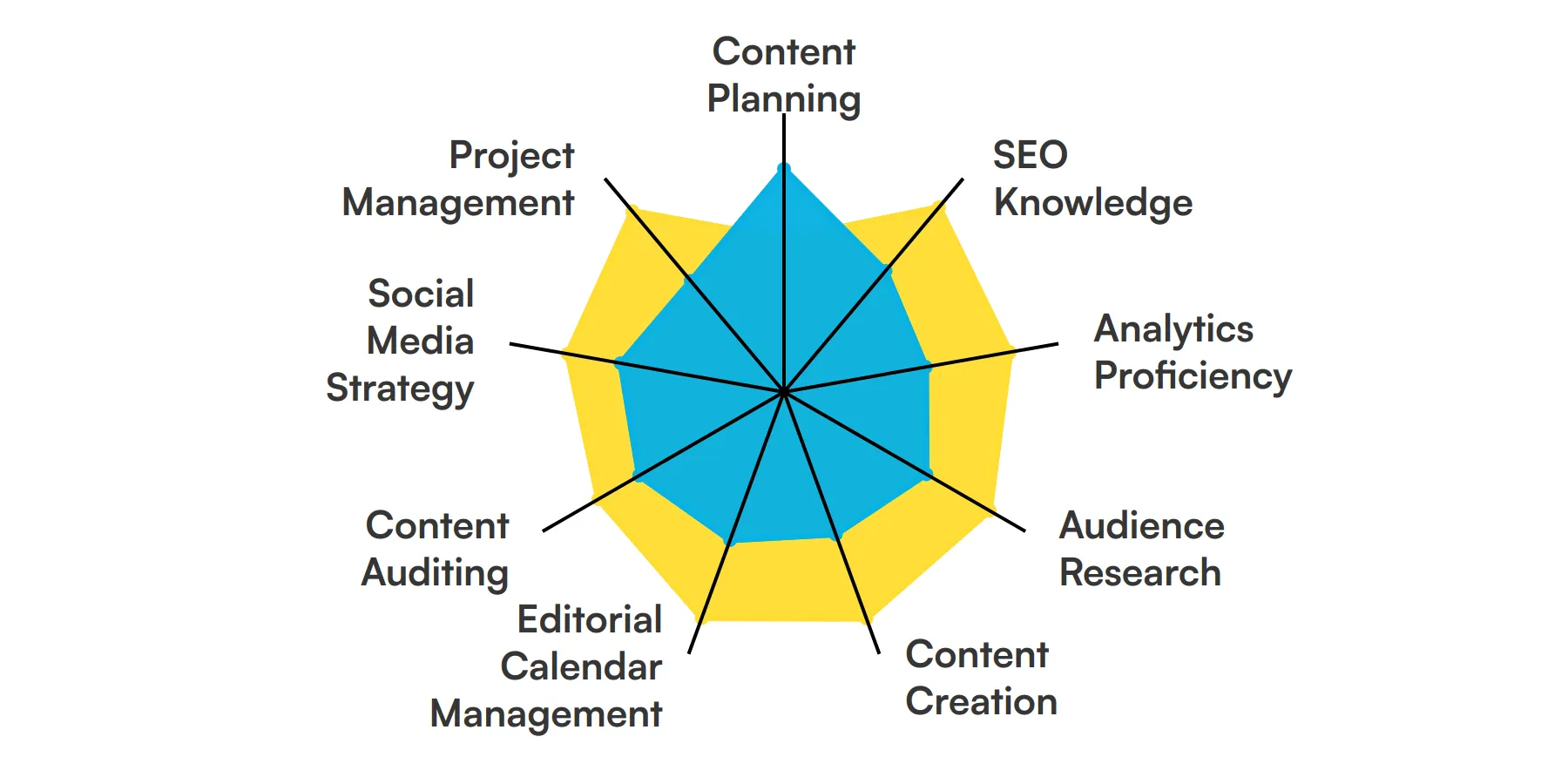
Content Planning
A content strategist needs to map out a comprehensive content plan that aligns with business goals. This involves identifying target audiences, setting content objectives, and determining the types of content that will be created.
For more insights, check out our guide to writing a Content Strategist Job Description.
SEO Knowledge
Understanding search engine optimization is crucial for a content strategist. This skill helps in optimizing content to rank higher on search engines, thereby increasing visibility and driving organic traffic to the website.
Analytics Proficiency
A content strategist must be adept at using analytics tools to measure the performance of content. This includes tracking metrics like page views, engagement rates, and conversion rates to make data-driven decisions.
Check out our guide for a comprehensive list of interview questions.
Audience Research
Knowing your audience is key. A content strategist should be skilled in conducting audience research to understand their needs, preferences, and behaviors. This helps in creating content that resonates with the target audience.
Content Creation
While not always the primary task, a content strategist should have a good grasp of content creation. This includes writing, editing, and possibly even multimedia production to ensure high-quality content.
For more insights, check out our guide to writing a Content Writer Job Description.
Editorial Calendar Management
Managing an editorial calendar is essential for keeping content production on track. This involves scheduling content, coordinating with team members, and ensuring deadlines are met.
Content Auditing
Regularly auditing existing content helps in identifying gaps and opportunities for improvement. A content strategist should be able to assess the current content landscape and make recommendations for updates or new content.
Social Media Strategy
A content strategist should understand how to leverage social media platforms to distribute content effectively. This includes knowing the best times to post, the types of content that perform well, and how to engage with the audience.
Check out our guide for a comprehensive list of interview questions.
Project Management
Managing multiple content projects simultaneously requires strong project management skills. A content strategist should be able to coordinate tasks, manage timelines, and ensure that all team members are aligned.
11 secondary Content Strategist skills and traits
The best skills for Content Strategists include Basic HTML/CSS, Graphic Design, Email Marketing, Video Production, Copywriting, CMS Proficiency, User Experience (UX), Public Relations, A/B Testing, Storytelling and Networking.
Let’s dive into the details by examining the 11 secondary skills of a Content Strategist.
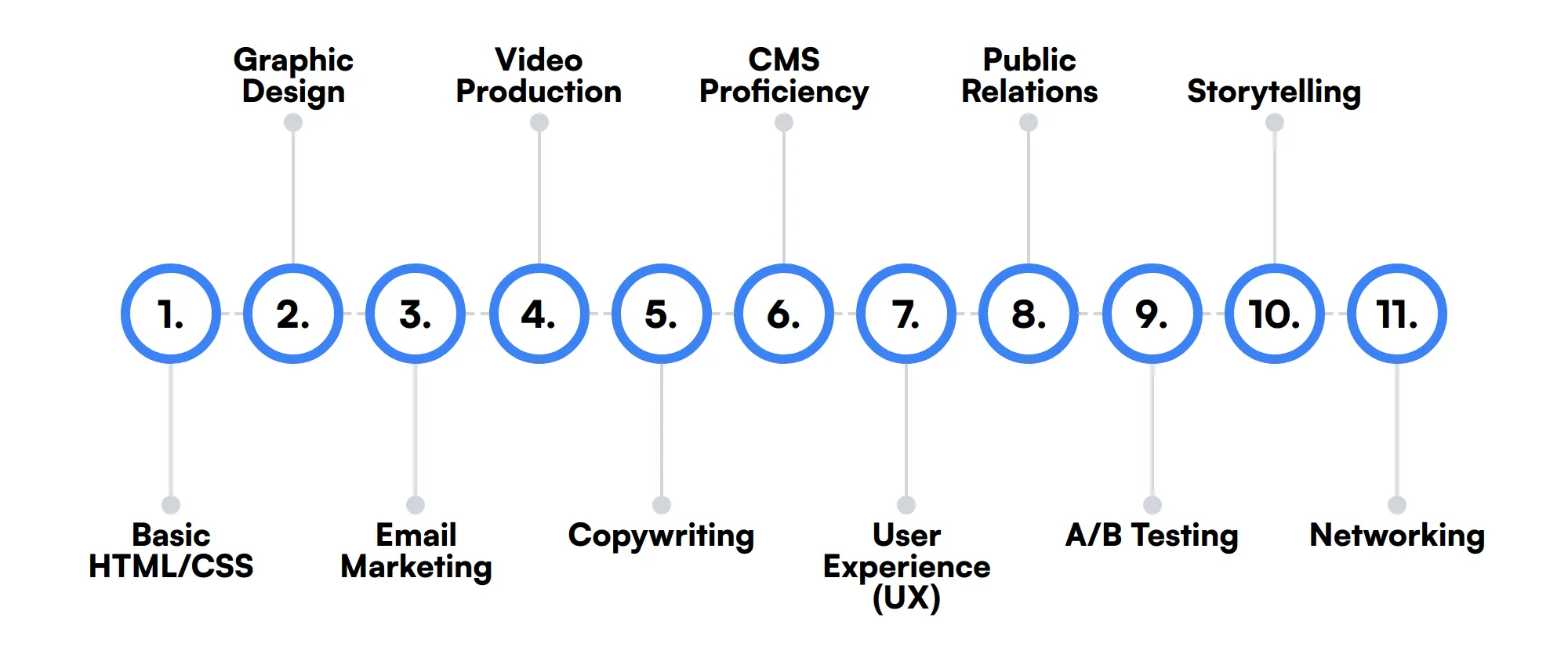
Basic HTML/CSS
Having a basic understanding of HTML and CSS can be beneficial for a content strategist. This knowledge helps in making minor edits to web pages and understanding the technical aspects of content publishing.
Graphic Design
While not a primary skill, knowing the basics of graphic design can help a content strategist in creating visually appealing content. This includes understanding design principles and using tools like Adobe Photoshop or Canva.
Email Marketing
Understanding email marketing strategies can be an added advantage. A content strategist can use this skill to create compelling email campaigns that drive engagement and conversions.
Video Production
With the rise of video content, having some knowledge of video production can be useful. This includes understanding the basics of shooting, editing, and publishing video content.
Copywriting
Strong copywriting skills can enhance the effectiveness of content. A content strategist should be able to craft compelling headlines, calls to action, and other copy elements that drive engagement.
CMS Proficiency
Being proficient in content management systems like WordPress or Drupal is important for a content strategist. This skill helps in efficiently managing and publishing content on the website.
User Experience (UX)
Understanding the basics of user experience can help a content strategist create content that is not only engaging but also easy to navigate. This includes knowing how to structure content for readability and usability.
Public Relations
Having some knowledge of public relations can be beneficial. This skill helps in understanding how to manage the brand's image and communicate effectively with the media and public.
A/B Testing
A/B testing skills can help a content strategist in optimizing content. This involves creating different versions of content and testing them to see which one performs better.
Storytelling
The ability to tell a compelling story can make content more engaging. A content strategist should be able to weave narratives that capture the audience's attention and convey the brand's message effectively.
Networking
Building relationships with industry influencers and other content creators can amplify the reach of your content. A content strategist should be skilled in networking to create valuable partnerships.
How to assess Content Strategist skills and traits
Assessing the skills and traits of a Content Strategist can be a nuanced process, given the diverse range of competencies required for the role. From content planning and SEO knowledge to analytics proficiency and audience research, a Content Strategist must wear many hats. It's not just about having the skills on paper; it's about demonstrating the ability to apply them effectively in real-world scenarios.
Traditional resumes and interviews often fall short in providing a comprehensive view of a candidate's capabilities. This is where skills-based assessments come into play. By leveraging tools like Adaface on-the-job skill tests, you can gain a clearer picture of a candidate's proficiency in key areas such as content creation, editorial calendar management, and social media strategy. These assessments can lead to a 2x improved quality of hires and an 85% reduction in screening time.
When evaluating a Content Strategist, it's important to consider their ability to manage projects, conduct content audits, and develop effective social media strategies. These skills are integral to ensuring that your content not only reaches but also resonates with your target audience. By using structured assessments, you can better identify candidates who possess the right mix of skills and traits to excel in your organization.
Let’s look at how to assess Content Strategist skills with these 6 talent assessments.
Content Strategy Test
Our Content Strategy Test evaluates candidates' abilities to develop comprehensive content strategies for digital platforms, focusing on audience analysis, content planning, and user experience optimization.
The test assesses skills in defining target audiences, conducting content audits, performing gap analyses, and developing multichannel content strategies. It also evaluates knowledge in SEO, content creation, and performance measurement.
Successful candidates demonstrate a thorough understanding of the content lifecycle, governance, and crisis communication, ensuring they can manage and optimize content effectively across various platforms.
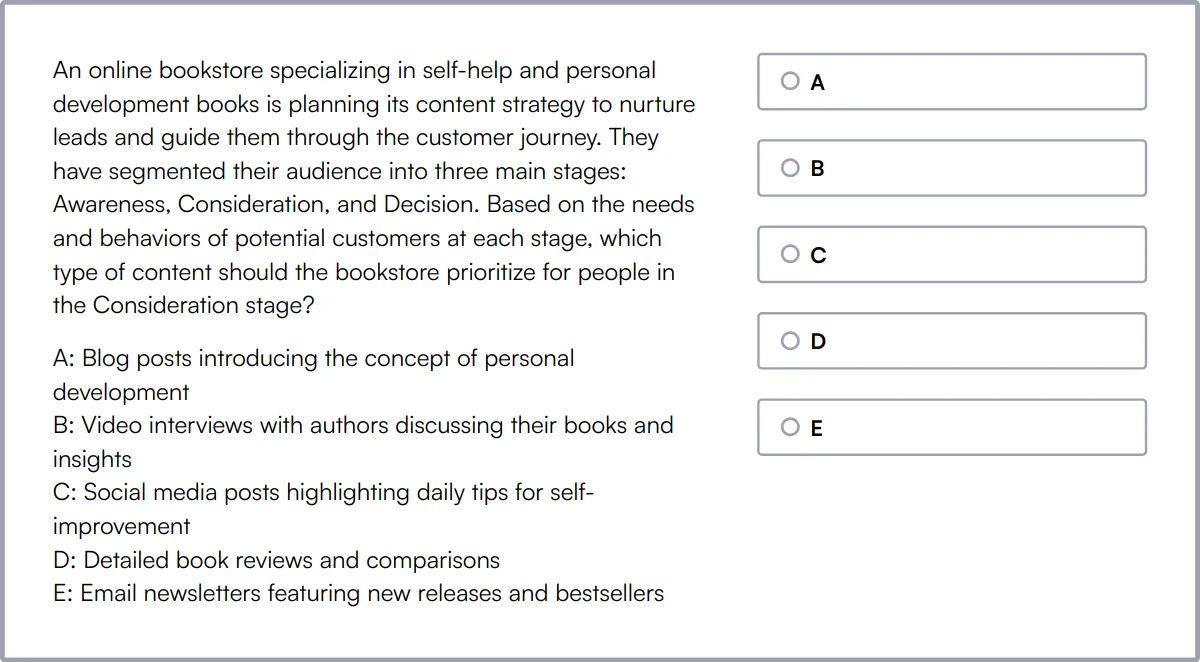
PPC Assessment Test
Our PPC Assessment Test challenges candidates on their knowledge of pay-per-click advertising, including keyword research, ad copywriting, and campaign optimization.
This test covers essential PPC skills such as digital marketing, online advertising, conversion tracking, and budget management. Candidates must also demonstrate their ability to analyze market data and report on campaign performance.
High-scoring individuals will show proficiency in managing and optimizing PPC campaigns, ensuring maximum ROI through effective ad placement and budget allocation.
Google Analytics Test
Our Google Analytics Test assesses a candidate's ability to use Google Analytics to drive data-driven decisions, focusing on setup, traffic analysis, and conversion tracking.
The test evaluates understanding of creating and customizing reports, analyzing user behavior, and implementing e-commerce tracking. It also tests knowledge of advanced analytics techniques and Google Tag Manager integration.
Candidates proficient in Google Analytics will effectively use the platform to analyze and enhance marketing campaigns, leading to better targeted strategies and improved business outcomes.
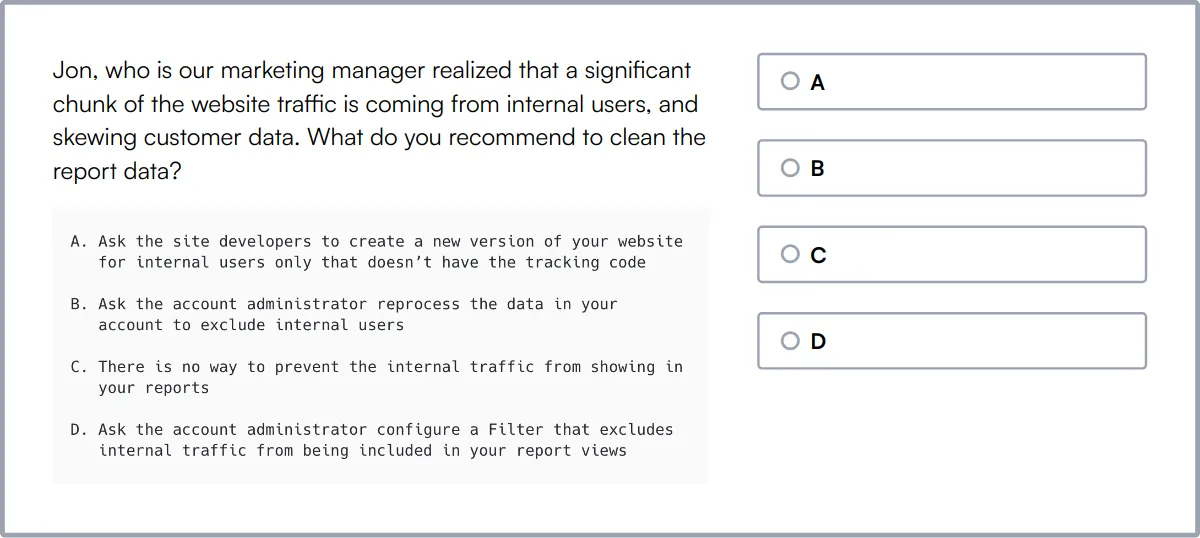
Market Research Test
Our Market Research Test evaluates candidates on their proficiency in market research techniques and data analysis to derive business intelligence and marketing insights.
This test challenges candidates' skills in market analysis, data interpretation, and quantitative aptitude, requiring them to demonstrate their ability to analyze and interpret market data effectively.
Skilled candidates will show a strong ability to translate market research findings into actionable insights, aiding strategic decision-making and competitive positioning.

Copywriting Skills Test
Our Copywriting Skills Test focuses on evaluating candidates' command over the English language, including grammar, vocabulary, and attention to detail in various writing formats.
The test assesses skills in headline and subheading creation, SEO writing, and audience targeting. It also evaluates candidates' abilities in writing for different stages of the customer journey and measuring copy performance.
Effective candidates will demonstrate a strong understanding of brand voice and tone, writing with empathy, and the ability to engage audiences through compelling copy.
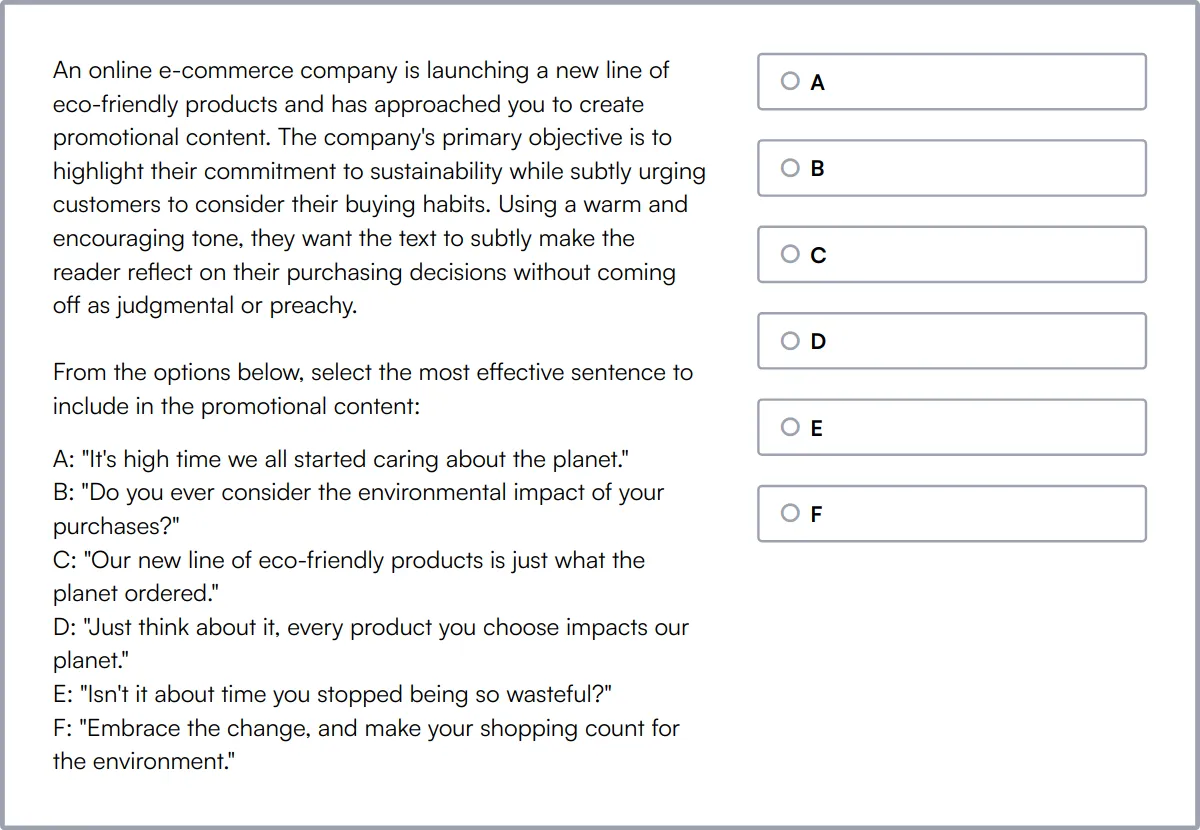
Digital Marketing Test
Our Digital Marketing Test evaluates a candidate's expertise in SEO, social media marketing, and other digital channels, using scenario-based questions to test real-life application.
This test covers a broad range of digital marketing skills including search engine marketing, ecommerce marketing, and mobile marketing. It also assesses proficiency in Google Analytics and AdWords.
Candidates excelling in this test will demonstrate a comprehensive understanding of digital marketing strategies and tools, capable of driving successful marketing campaigns across multiple digital platforms.
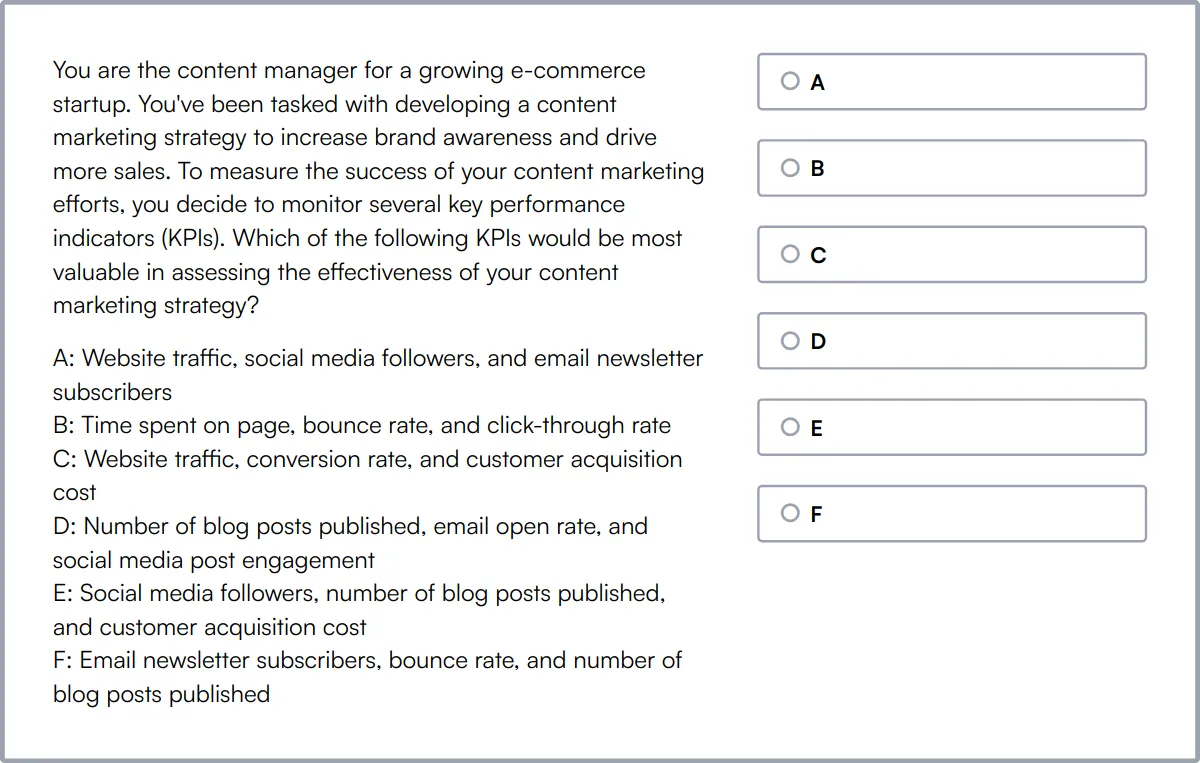
Summary: The 9 key Content Strategist skills and how to test for them
| Content Strategist skill | How to assess them |
|---|---|
| 1. Content Planning | Evaluate ability to strategize and organize content development. |
| 2. SEO Knowledge | Assess understanding of SEO tactics and their implementation. |
| 3. Analytics Proficiency | Check competence in using analytics to guide content decisions. |
| 4. Audience Research | Review methods for identifying and understanding target audiences. |
| 5. Content Creation | Observe quality and originality in content production. |
| 6. Editorial Calendar Management | Test skills in scheduling and managing content timelines. |
| 7. Content Auditing | Examine effectiveness in reviewing and optimizing existing content. |
| 8. Social Media Strategy | Assess strategic use of social platforms for content distribution. |
| 9. Project Management | Evaluate ability to lead and deliver projects on time. |
Content Strategy Test
Content Strategist skills FAQs
What is the importance of content planning in a Content Strategist role?
Content planning helps in organizing and scheduling content to ensure consistency and alignment with business goals. It involves setting objectives, identifying target audiences, and creating a roadmap for content creation and distribution.
How can SEO knowledge benefit a Content Strategist?
SEO knowledge enables a Content Strategist to optimize content for search engines, improving visibility and driving organic traffic. This includes keyword research, on-page optimization, and understanding search engine algorithms.
What tools can assess a candidate's analytics proficiency?
Tools like Google Analytics, SEMrush, and Ahrefs can be used to evaluate a candidate's ability to analyze data, track performance metrics, and derive actionable insights to improve content strategies.
Why is audience research important for a Content Strategist?
Audience research helps in understanding the needs, preferences, and behaviors of the target audience. This information is crucial for creating relevant and engaging content that resonates with the audience.
What should be included in a content audit?
A content audit involves evaluating existing content for quality, relevance, and performance. It includes checking for outdated information, identifying gaps, and ensuring content aligns with current business objectives and audience needs.
How does a Content Strategist use an editorial calendar?
An editorial calendar helps a Content Strategist plan and schedule content in advance. It ensures timely publication, maintains consistency, and allows for better coordination with other marketing activities.
What is the role of social media strategy in content strategy?
A social media strategy involves planning and executing content distribution on social platforms. It helps in reaching a wider audience, engaging with followers, and driving traffic to the main content hub.
How can a recruiter assess a candidate's copywriting skills?
A recruiter can assess copywriting skills by reviewing writing samples, conducting writing tests, and evaluating the candidate's ability to create clear, compelling, and persuasive content tailored to different audiences and platforms.

40 min skill tests.
No trick questions.
Accurate shortlisting.
We make it easy for you to find the best candidates in your pipeline with a 40 min skills test.
Try for freeRelated posts
Free resources



